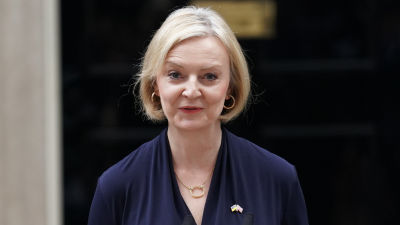Is Liz Truss entitled to a severance package after PM resignation and how much could she receive?

On Thursday, Liz Truss announced that after 45 days as prime minister she would be resigning, following a dramatic couple of weeks which saw her lose two of her Cabinet ministers and perform a number of policy U-turns.
Consequently, she has become the shortest serving PM in British history, after only taking up the post in September.
One of the immediate talking points around her resignation has been whether she qualifies for any allowance given her short stint in office.
So, what exactly is she permitted to receive under the law?
What is Ms Truss entitled to?
Under the public duty costs allowance (PDCA), individuals who hold various paid positions in government and the opposition can receive a quarter of their salary when they leave their job prematurely.
The law was introduced by the then cabinet secretary, Sir Robin Butler, after Margaret Thatcher’s resignation.
All ministers are covered by the guidance, though it does not include parliamentary private secretaries or trade envoys, who are unpaid.
The legislation also states it only applies to those who are under the age of 65 and who leave their job for any reason other than dying.
If a person who holds an eligible role leaves but returns to another within three weeks of their departure, then they also are not entitled to a severance package.
Ministers who meet this criteria will eventually receive a payment when they leave altogether, but they do have the option to refuse it.
Want a quick and expert briefing on the biggest news stories? Listen to our latest podcasts to find out What You Need To Know...
For example, Michele Donelan, who was Education Secretary for two days before Boris Johnson resigned, donated her monies to charity.
Under the PDCA, Ms Truss can be awarded a reimbursement - in full this equates to £115,000 - which is afforded to all former prime minister's “arising from their special position in public life”.
In 2020/21, Sir John Major, Tony Blair, Gordon Brown and David Cameron all claimed more than £110,000, while Theresa May claimed about £58,000.
However, to receive the full payment Ms Truss will need to submit that sum total in expenses, according to Cabinet Office guidance.
It states: "Former prime ministers or their staff may only be reimbursed for legitimate salary or office expenses incurred in meeting the demands of the former prime minister’s public life up to the annual limit."
The guidance, though, does not make it clear exactly what kind of public duties, and what kind of costs, are reimbursed with the PDCA.
Research from Full Fact adds that it is not correct to describe this package as a “salary” or a “pension” adding that to say former prime ministers simply “get” this money could fail to make a clear distinction.
What has Ms Truss been urged to do?
Since her resignation was announced, the PM has widely been called on not to accept a severance package by politicians and workers' unions.
Labour leader Sir Keir Starmer told ITV’s Good Morning Britain that the "right thing to do" for Ms Truss is to reject the payment.
“She’s done 44 days in office, she’s not really entitled to it, she should turn it down and not take it," he said.
According to Sir Ed Davey, leader of the Liberal Democrats, Ms Truss' short premiership does not permit her to receive a severance package.
Asked if she deserves the payment he said: “No. Most people have to work at least 35 years to get a full state pension.
“I think working 45 days shouldn’t give you a pension that is many many times what ordinary people out there get after a lifetime of work”.
Meanwhile, Mike Clancy, General Secretary of Prospect, whose membership includes large numbers of civil servants, said: “The government are in a chaotic merry go round of ministers, with huge redundancy costs for the taxpayer.
"At the same time, they want to cut public servants pay in real terms and erode their redundancy conditions. It’s one rule for ministers another for hard working public servants. This is wrong."